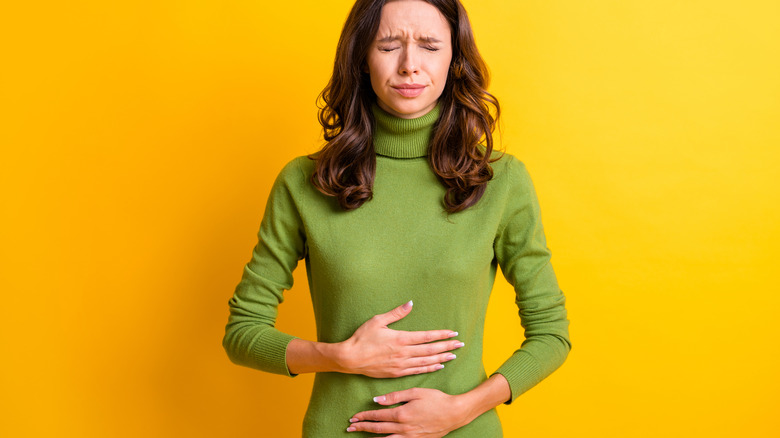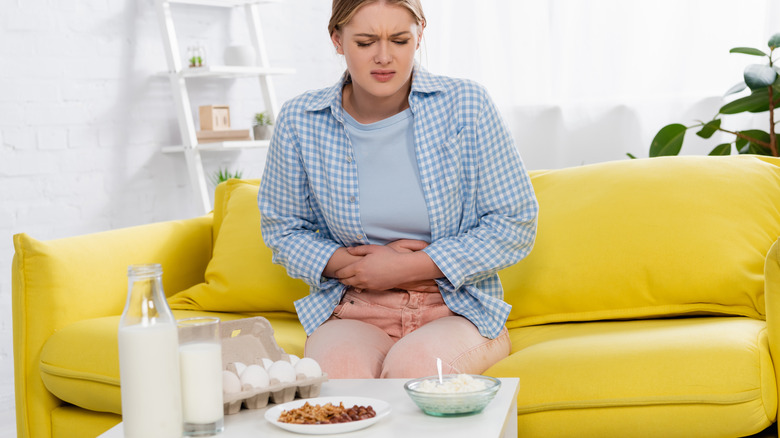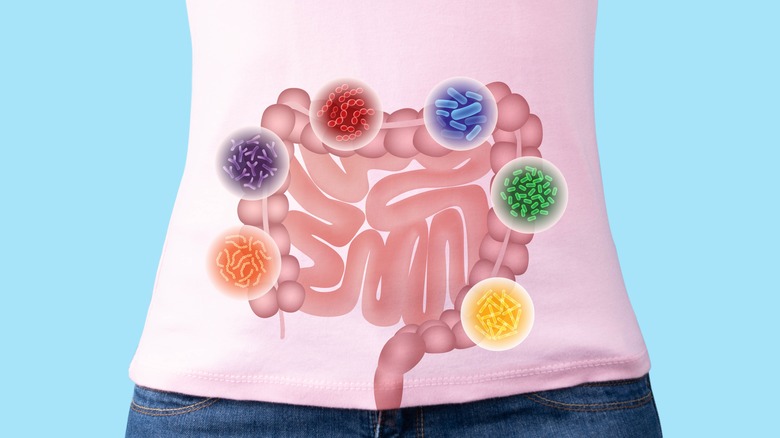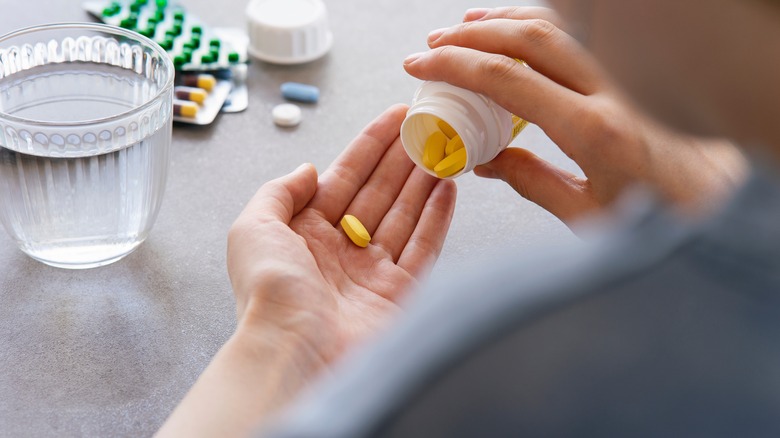What Your Farts Can Tell You About Your Health
Some people would die of embarrassment from just admitting that they pass gas. It's because no one wants to hear or smell your farts. But what if you should be paying attention to how much you fart, and what it smells like?
Farts are produced when gut bacteria break down undigested food in your colon, explains gastroenterologist Eamonn Quigley to Houston Methodist Gastroenterology Associates. And most of this gas leaves when you toot. Swallowed air is another source of gas, but you burp most of this out. Your farts are made up of different types of gas — some are smelly, but most aren't. Your farts won't smell when you pass mostly oxygen, carbon dioxide, hydrogen, methane, or nitrogen. But when you pass bad-smelling gasses like hydrogen sulfide or gasses released from meat digestion, you're bound to avert a nose or two. Your farts also smell bad when you haven't pooped.
Even if you feel like you fart a lot, that might not be the case. Most folks pass gas up to 12-25 times a day or even more depending on consumed food. And most people really let it go when they sleep. Most of the time, it is the non-smelly gasses we pass, and the smelly ones are only released 1% of the time (via Medical News Today). These fart facts are good to know because they represent what's normal and healthy. But there's more your farts can reveal about your health — even health conditions.
You may need to check what you eat
It's quite simple: The foods you eat affect how much you fart and how smelly your flatulence is. One particular food group that can make you really gassy is fiber. This is because humans don't digest fiber, so it goes unchanged to the colon where it is fermented by gut bacteria — a process that releases gas. However, eating fiber is not bad. For one, it helps prevent constipation. The good bacteria in your gut also feed on fiber (per Atlas Biomed). But the downside is that fiber causes excessive gas, especially when you take in too much of it. Some fiber-rich foods that cause flatulence include Jerusalem artichoke, beans, legumes, and cruciferous vegetables like cabbage, broccoli, cauliflower, and dark leafy greens.
Proteins are another food group that can cause smelly farts. This is because they contain sulfur, which is acted upon by gut bacteria to produce hydrogen sulfide (which smells like rotten eggs). You may also fart a lot if you eat foods sweetened artificially with polyol sweeteners like sorbitol, lactitol, mannitol, and xylitol. These sweeteners are fermented by gut bacteria, as they can't be digested.
When it comes to producing gas in response to food, everyone has different reactions. So you need to watch out for foods that increase your farts and consume them mindfully. When adding fiber to your diet, you may need to start small and taper up your consumption. After a while, your body will adapt to the foods and you'll likely produce less gas after eating them, notes Everyday Health.
You may be swallowing too much air
You may be passing so much gas because you've actually gulped down a lot of air. Normally, you swallow air from pretty innocent things like when you talk, pant, eat, or drink water. At the end of the day, you can swallow as much as two quarts of air, some of which you pass as gas (via Pharmacy Times). You take in more air if you eat too fast, eat too much, drink with a straw, talk while you eat, or chew gum. So if you have the habit of doing these things, cutting down on these habits may reduce your flatulence.
In most cases, you get rid of the air you swallow by farting or burping without much problem. However, some people with what is known as aerophagia swallow more air than normal, which leads to more gas as well as other uncomfortable gut symptoms like bloating, abdominal pain, and distension (via Healthline). Certain groups of people are more prone to aerophagia including smokers, mouth breathers, people with loose-fitting dentures, or people using a continuous positive airway pressure (CPAP) machine to treat obstructive sleep apnea.
You may have a digestive disorder
There are certain digestive disorders that can make you fart excessively or make your farts really smelly. For example, people with inflammatory bowel diseases which include Crohn's disease and ulcerative colitis tend to produce more gas than most other people. Additionally people with inflammatory bowel diseases are more likely to have other conditions associated with excessive gas, such as lactose intolerance (via Inflammatory Bowel Disease).
Another digestive disorder commonly associated with excessive gas is irritable bowel syndrome (IBS). People with this condition usually feel like they produce more gas, but most of them don't. In any case, most people with IBS are sensitive to passing gas and may even experience pain while farting. There isn't a clear explanation for why this happens, though. It could be that in those with the condition, the nerves of the gut are hyperactive, which would make the gut more sensitive to normal amounts of gas. Another explanation is that people with IBS are sensitive to various foods, and this causes a variety of gut problems, including gas. There are, however, drugs that help to reduce symptoms related to gas in people with irritable bowel syndrome (via Irritable Bowel Syndrome).
There are also other digestive disorders that are associated with excessive farting, including constipation, gastroenteritis, diabetes, eating disorders, dumping syndrome, gastroesophageal reflux disease, autoimmune pancreatitis, and peptic ulcers (via Healthline).
You may have food intolerance or sensitivity
Excessive gas is a problem for people with food intolerance or sensitivity. These folks can't break down particular foods, usually because they don't have the digestive enzyme for that food. So, they experience gut symptoms including excessive gas when they eat the foods that they are sensitive to. For example, people with gluten intolerance find it hard to digest gluten, a protein found in grains like wheat, rye, and barley. Eating gluten can make them pass more gas (via the Cleveland Clinic).
One common food intolerance is lactose intolerance. It happens when an individual doesn't produce the enzyme lactase or produces lactase in small quantities. It can also be caused by a disease or bacterial infection that affects the production of lactase. Lactase is the enzyme that digests lactose in the gut. So if you don't have this enzyme and you eat foods containing lactose, such as milk and dairy products, lactose within them is not digested. When the undigested lactose enters the colon, bacteria ferments it and produces excess gas, which can cause farting (via Health One Medicine).
Your gut bacteria may be imbalanced
Bacteria within your gut serve many purposes. In fact, certain gut bacteria are capable of reducing flatulence. But there are some bacteria that increase the production of gas. And when these bacteria outnumber others, you may get bloated or fart a lot (via Biomes).
Per Bio-K+, the composition and the balance of bacteria in your gut fluctuates in response to factors like stress, travel, and the food you eat. This can happen as quickly as within 20 minutes following a meal. Some of the bacteria that cause increased smelly farts include the methanogens and sulfate-reducing bacteria. These bacteria increase when you eat particular foods, because they help digest them. For example, sulfate-reducing bacteria break down sulfur molecules found in meat protein and release smelly gas.
Most times the tips in gut bacteria composition are temporary. However, an overgrowth of gut bacteria can happen when the processes that maintain the balance of gut bacteria are affected. These include the production of chemicals like gastric acid, bile, enzymes, and immunoglobulins, or the movement of food through your gut. This leads to a condition known as small intestinal bacterial overgrowth (SIBO), which is common among people with irritable bowel syndrome. This causes excess gas production because more of certain types of bacteria means more gas. This condition comes with other symptoms like bloating, abdominal pain, weight loss, indigestion, diarrhea, nausea, and constipation (via the Cleveland Clinic).
Your mental health may be suffering
It may seem far-fetched, but the state of your mental health can have effects on how much you fart. One study, presented in the United European Gastroenterology week, 2021, reported that among 6,000 surveyed participants across the United States, United Kingdom, and Mexico, people with higher stress, depression, anxiety, and poor quality of life farted more within 24 hours than others. The study assessed 24-hour gas-related symptoms including burping, bad breath, trapped gas, abdominal distension, bloating, and farting. Those participants with higher stress, depression, anxiety, and poor quality of life also experienced more of these other gas-related symptoms.
A possible reason for how your mental state affects your gut is that movement of food through your gut slows down when you're stressed or anxious. And if food stays longer in your colon, it has more time to be fermented by bacteria, which means more gas. You may also pass more gas if you hyperventilate or pant during a panic attack, for example. When you hyperventilate, you breathe in excess oxygen, which goes into blood. And when you pant, you swallow air that goes to your gut. One of the routes by which the excess oxygen or swallowed air leaves the body is through farts (via Calm Clinic).
Medications may be to blame
Although it is often overlooked, one of the side effects of taking certain medications is passing really awful-smelling gas. Not only can these medication farts be embarrassing to pass, they may only worsen that miserable feeling that comes with being sick. Some commonly prescribed drugs that cause these smelly farts include diabetes drugs like metformin, antibiotics like ciprofloxacin and Augmentin, ulcer drugs like rabeprazole, blood pressure drugs like irbesartan, valsartan, losartan, and lisinopril, lipid or cholesterol-lowering drugs like lovastatin and atorvastatin, antianxiety and antidepressant drugs like venlafaxine escitalopram, and paroxetine, and pain medications like pregabalin and naproxen, among others (per The People's Pharmacy).
Passing more gas is something you may need to prepare for if you're getting long-term treatments. For example, if you're getting treated for cancer, you may pass gas frequently and it may be in larger quantities than you're used to. For starters, certain cancers cause you to produce more gas. And then, chemotherapy can affect the balance of gut bacteria or the time food spends in your gut, making you pass more gas. Also, you may fart more because of stress, medications, or radiation therapy, you may also experience bloating, constipation, or diarrhea (via OncoLink).
You might be pregnant
One awkward change many women experience during pregnancy is that they produce more gas and release smelly farts. And this can start even in the early weeks of pregnancy, with expecting people passing gas that smells lie rotten eggs. However, passing gas during pregnancy is not a cause for concern for the mother or the baby. It is really just one annoying and embarrassing effect of having a baby growing in you (via Mylo Family).
Women pass more gas during pregnancy mainly because their bodies produce more of the hormone progesterone. This hormone causes the relaxation of muscles throughout the body, including muscles of your gut, explains the American Pregnancy Association. This relaxation can slow down the passage of food in your gut, giving bacteria more time to produce more gas that might come out as farts. Furthermore, as the baby grows, there would be more pressure and compression in the abdomen. This, too, slows down digestion and worsens gas at the later stages of pregnancy. Ironically, progesterone also causes the relaxation of muscles that help you hold in farts. So you may find that your farts have really bad timing.
You just gave birth
As if passing a lot of gas during pregnancy isn't enough, many women also produce and pass more gas after giving birth. It's one of the changes that happen just after giving birth, a time known as the postpartum period. So, this form of gas is known as postpartum gas.
A number of factors can cause postpartum gas. For example, in the process of giving birth, there could be injury to the nerves and muscles in the pelvic floor, causing it to weaken. And it is your pelvic floor that gives you control over farting (via Medical News Today). Damage to the pelvic floor can also follow an episiotomy, a minor surgery performed during childbirth.
Medications given during childbirth could also be behind the farting. For instance pain relievers like pethidine, morphine, and fentanyl that may be given during labor are known to cause gas (via Mylo Family). In the postpartum period many women also burp more, and experience sharp abdominal pains, cramping, bloating, constipation, and involuntary or loose bowel movements, notes Medical News Today.
It may just be your period
Period farts are one of the weird changes women face around that time of the month, aside from bloating, cramping, and breast tenderness, of course. So if you find yourself being extra gassy, your period might be looming or might have started. Even though period farts may not be top of your list of period-related symptoms, it can be embarrassing to pass so much gas. And period farts can be really smelly.
Again, it's changes to hormone levels that cause period farts. As you get close to your period, estrogen and progesterone levels rise, and these hormones cause you to have more gas. Also contributing to period farts are prostaglandins. They are released so your womb can shed its lining. But excess amounts of prostaglandins travel through the blood and, on reaching your gut, they cause the muscles there to contract. This moves down the contents of your gut, which include feces and gas. Period farts smell because the composition of your gut bacteria changes around the time of your period. It doesn't help that you have a bigger appetite and crave more junk during this period. As you know, what you eat affects how your farts smell (via Healthline).
You're getting older
It can be embarrassing to let one rip at the dinner table or in front of the grandkids. But breaking more wind than you would like to is one of those experiences that can come with aging. And in some cases, farting can be uncontrollable, uncomfortable, or even painful.
There are many possible reasons you may fart more as you age. To begin with, your body produces less lactase as you grow older. This means you become more intolerant to lactose and might pass gas on eating milk, cheese, or dairy. With aging, your digestive process slows down, your digestive muscles weaken, and your body finds it harder to digest certain foods. What this means is that there will be more undigested food in the gut and it will spend more time at the mercy of gas-producing gut bacteria.
Many seniors also have conditions like gastroenteritis, diabetes, peptic ulcers, inflammatory bowel diseases, and gastroesophageal reflux disease, all of which cause more gas. In some cases, it's the long-term use of medications used to treat conditions common to older folks — such as diabetes or hypertension — that causes the farting (via Assisting Hands).












